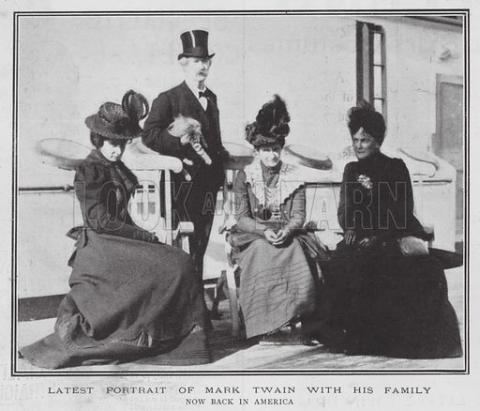Return to the US until Livy's death and another return to the US.
Was this when Americas was great? See America at the Turn of the Century: A Look at the Historical Context, an article published by the Library of Congress from their collection of The Life of a City: Early Films of New York, 1898 to 1906.
Soon after his return, Mark Twain began to take an active part in the campaign begun by “anti-imperialists” — including Howells and William James— in protest against the policies of the United States, Great Britain, and other powers in the Philippines, South Africa, and China. Introducing Mark Twain at a Lotos Club dinner on 10 November 1900, Howells expressed a hope that the humorist might become the satirist-interpreter of his county. No one else has ever been “so fully in the joke of us,” said Howells, “and at no other time in our national life have we been a greater joke or more needed interpretation.” In reply, Mark Twain praised the “righteous war” that had freed Cuba, but deprecated the miscarriage of good intentions in the Philippines (“Mark Twain,’ New York Times Saturday Review of Books and Art, 17 November, p- 789).
[From Susan Harris in Mark Twain in Context]
"From Twain’s viewpoint in 1898, the Americans’ actions accorded with their history, values, and mission to the world ~ i.e., to intervene in other countries’ internal affairs only if the United States was helping subject peoples achieve independence comparable to its own,
Until the United States Annexed the Philippines"
Further in her essay, Harris offers a possible personal explanation for Twain's conversion:
" I think one key to Twain’s dismay at the Americans’ annexation of the archipelago comes from his acute sense of social justice. At bottom, he simply hated cruelty and the sight of suffering, whether it was a dog being tortured or a culture being destroyed. If we think through the numerous incidents of injustice that he reports, both in his fiction and in his social writings, we see that the majority involve harm done to vulnerable people: families torn apart (the slave scenes in A Connecticut Yankee, Roxy's attempt to save her son from being sold down the river in Pudd'nhead Wilson), Chinese immigrants stoned and set upon by dogs (“Disgraceful Persecution of a Boy,” “Goldsmith’s Friend Abroad Again”), mob-fueled lynchings (“The US of Lyncherdom”), oppressive and violent regimes (“King Leopold’s Soliloquy”), indigenous lives destroyed by western aggressors (the Australia section of Following the Equator). In his letters and autobiographical writings Twain recorded stories about his mother’s sense of justice, especially her sensitivity to Sandy, a slave child she owned who had been taken from his own family (though I note there is no mention that Jane Clemens ever contemplated freeing the child, or helping him find his family). Twain’s in-laws’ abolitionism also influenced him, as did his acquaintance with the liberal faction of the northern intelligentsia. But these influences built on his innate sense of horror at the cruelty of which his fellow men were capable. He felt called upon to defend the defenseless — whether they were the victims of domestic lynchings, the Africans brutalized by Belgian colonialism, or the Filipinos raped and waterboarded by American troops. And with this, he wanted, desperately, to preserve his country’s honor, its standing in the community of nations."
"That sense of honor is the second key to Twain’s dismay. "
